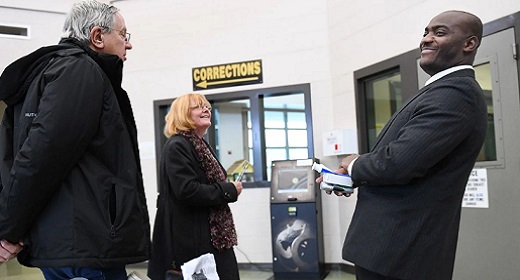by Eli Saslow: They had decided to welcome him even if the United States would not, so Melody Hart and her husband, Gary Benjamin, arrived at the courthouse with gifts for an immigrant they’d never met…
They carried outfits for him in three sizes and a new winter coat to guard against the Ohio cold. They brought instruction manuals to help him learn English, a booklet of hymns to sustain his spirit and bottles of champagne in case he walked out of the courtroom free after being detained by the U.S. government for 25 months.
They also brought a charter bus filled with 32 friends from Cleveland Heights, Ohio, a group consisting mostly of retirees, church members and community activists. Together they traveled four hours into Michigan to witness the latest court hearing in the ongoing saga of Ansly Damus, a Haitian ethics professor who had come to the California-Mexico border in the fall of 2016 to seek asylum. Rather than enter the country illegally, Damus had followed U.S. protocol by presenting himself to Border Patrol and saying he feared for his life. Then he had been handcuffed and flown to a detention facility with empty beds in Ohio, where he’d spent the past two years waiting for a final resolution in his case.
The government had denied Damus parole because it considered him a flight risk with no meaningful connections in Ohio, but now the courtroom was filled with Ohioans who had come to support him.
“I hope this shows that people in this country care about what’s happening to him,” Hart, 66, told her husband as a courtroom security guard left to get extra chairs. “He has to believe that he’s come to the right place.”
She had spent the past year trying to deliver that message to Damus, even as the country around her was becoming increasingly resistant to a rising number of asylum seekers including an estimated 7,000 who caravanned last month toward the California border on the same path that Damus had taken two years before. Most asylum seekers now wait at least several months for a final decision in their case, but there are also those like Damus, who became stuck in an overwhelmed system where cases can drag on for years.
He had been detained in Ohio for more than 14 months when Hart and Benjamin learned about his case from a friend involved in immigrant rights issues. Twice Damus had been granted asylum by the immigration courts, and twice the government had successfully appealed. The friend asked Hart and Benjamin if they could sponsor Damus’s parole application and offer him support. They were both active in the local Democratic Party. They volunteered for a half-dozen social justice organizations and served on the board of their church. “We’ll do whatever we can,” Hart remembered saying, and later that week she wrote her first of several dozen letters to Damus, using Google to translate it from the English he didn’t speak into the French that he did.
“My grandfather came here from Russia through Ellis Island,” she wrote in February. “It was different then, but this is a long tradition. We are right by your side. Keep the faith!”
“Your long wait will soon be over,” she wrote later that spring.
“Please don’t get discouraged,” she wrote in July.
“I truly believe we are a nation of freedom and justice,” she wrote in October, on Damus’s second anniversary in detention. “One day our prayers will be answered, and you will be free.”

Supporters board the charter bus, with sign spelling a hashtag, in Cleveland Heights, Ohio. (Matt McClain/The Washington Post)

Benjamin carries a suit meant for Damus to the Ann Arbor Federal Building. (Matt McClain/The Washington Post)
Now Hart watched as two security guards led Damus into the courtroom. He wore one of Benjamin’s old suits. He had shackles affixed to his ankles even though he had never been arrested or accused of committing a crime. The last time he had appeared in front of a crowd, he was delivering a lecture in Haiti on the history of economics. “I am so embarrassed,” he whispered to his courtroom interpreter, speaking in Creole, and then he sank into his chair as lawyers presented the basics of his case.
Damus, 42, had once been a popular professor, fluent in three languages and possessing degrees in ethics and economics. Then, according to his asylum statements, he had given a lecture in 2014 about the unethical behavior of a local politician who he accused of collaborating with gangs, and later that same day gang members attacked him as retribution, burning his motorcycle and threatening to kill his wife and two young children unless he left the country. Damus fled a week later for Brazil, where he knew other Haitian refugees, and he spent nearly two years working in construction and living in a refugee camp before traveling by bus to the United States.
Those two years in Brazil were the reason U.S. officials wanted to deny his asylum claim, saying Damus had attempted to settle there permanently. Damus said he was threatened and persecuted as a Haitian immigrant in Brazil and always planned to come to the United States, but it had taken him two years to save money and plan for the trip.
This particular hearing was not about the merits of Damus’s asylum case but instead a federal court hearing about the condition and length of his detention: 766 days at a county jail intended for short-term stays, which meant the facility had no outdoor space, no exercise room and no Internet access for inmates.
“Yesterday was the first day Mr. Damus had seen daylight in over two years,” his lawyer told the judge.
The lawyer said Damus’s liberty was being unjustly violated and that he should be paroled immediately as his immigration case continued through the courts. The government said it had a right to detain Damus for the entire length of his asylum proceedings, no matter how long that took, and if he wanted to be released he could drop the case and be deported back to Haiti.
U.S. District Judge Judith Levy glanced at the briefings and then looked at Damus. She said the Ohioans in the courtroom were evidence that he had “a community that cared about him.” She said the government had offered no proof that he was a danger or a flight risk. She said: “This restriction on Mr. Damus’s liberty is extraordinary.” But then, instead of issuing an immediate ruling, she said she needed more time. Maybe she would make a ruling in the next hours, she said. Or maybe she would request more evidence and schedule another hearing in a week.
The judge stood to leave, and two security guards led Damus back into detention. “This is madness,” Hart said as the courtroom emptied around her. She went back to the bus and back home to Ohio, where late that night she sat down at her computer. If she wrote another letter to Damus now, she could mail it in the morning.
“I know our prayers will soon be answered,” she wrote. “Keep the faith.”
***

Benjamin sits in a room of his house in Cleveland Heights, Ohio, on a bed prepared for Damus. They had never met, but Benjamin and his wife were ready to let Damus stay in their home until his case is resolved. (Matt McClain/The Washington Post)
What she never told Damus was that her own faith in America was increasingly precarious, because so many facts about his detention made her question the country’s treatment of immigrants in 2018. “How can something like this be happening here?” she asked friends, politicians, pastors and lawyers, until together they decided to start a support group for Damus, hoping to compensate for what they saw as the government’s failings.
When they learned Damus was being held at a short-term facility with no access to outdoor space, they began mailing him pictures each month so he could see the seasons changing in Ohio.
When they discovered the jail’s library offered nothing in French or Creole, they started mailing Damus 20 pages of reading material each day, from “Madame Bovary” to Karl Marx.
When they found out he had no way to communicate with his wife because the jail didn’t allow detainees to use email or make international calls, they contacted his wife on Facebook and began relaying messages between them.
And when Hart learned that Damus had not had a visitor during his first 14 months in America other than a pro-bono lawyer, she and Benjamin decided to go see him. They went one afternoon in January during the jail’s allotted 30-minute visitation period. Hart picked up a phone attached to the wall and stared through a thick pane of glass, but instead of seeing Damus on the other side, she saw a computer monitor. The jail only allowed electronic visitation, and after a few seconds Hart saw Damus appear on the screen. He was somewhere else in the jail, and for the next half-hour they stumbled through a conversation. Damus spoke only a little English, so Benjamin tried using his rusty high school French. Hart thought the visit was awkward, distant and impersonal, until the screen flashed a two-minute warning and Damus began his goodbyes. “Thank you,” he remembered telling them. “This is my best day. You have given me so much hope.”
They began visiting him every week, but what they really wanted was to give him a path out of detention. They offered to become his official sponsors, filing paperwork so Damus could stay at their home if he was released from jail. It was just the two of them in a house of nearly 5,000 square feet. Hart worked in finance and Benjamin was a discrimination lawyer, but volunteerism remained a centerpiece of their marriage. They had met a decade earlier while knocking on doors for a statewide political campaign, and together they attended monthly city council meetings and organized fundraisers in support of universal health care. They’d hosted several houseguests over the years, from foreign exchange students to Democratic campaign workers who moved to Ohio during presidential elections.
Now, the day after Damus’s hearing, Hart’s cellphone rang with an unfamiliar number, and she called out to Benjamin. “This could be news!” she said, and then she put the call on speaker so Benjamin could also hear. It was Damus’s lawyer, and he said the government had decided to offer a deal rather than waiting for the judge’s decision. It was willing to release Damus from detention if he agreed to two conditions. He would be required to wear an electronic ankle-monitoring device. He would also be expected to live with Benjamin and Hart until his asylum case was resolved.
“Of course!” Hart said. “That’s what we’ve been planning on.”
“Wonderful,” the lawyer said, and then he paused.
“I just want to be upfront in saying this could go on for a long time,” he told them. “It might be several months before his asylum case is resolved, maybe even years. Are you okay with that?
Several of Hart’s extended family members had asked their own questions during the last months: Did she really understand what she was getting into? Was it safe to open up their home? How much long-term support were they willing to extend to a virtual stranger? Even if Damus was a well-educated college professor, he didn’t speak English. He had no other contacts in the United States. He had no money. He had zero job prospects. He had nothing and nobody else to rely on.
“We’re ready,” Hart told the lawyer.
“Yes,” Benjamin said. “Absolutely.”
They were told to meet Damus the next day at an administrative office on the outskirts of Cleveland, but first Hart began labeling dozens of items around the house with handwritten sticky notes to help Damus with his English vocabulary. “Stove,” Hart wrote. “Table.” “Counter.” “Cups.”
“We’d better go,” Benjamin told her. “We don’t want to be late.”
“Hold on,” she said, ripping off another stack of sticky notes. “Couch.” “Lamp.” “Chair.”
“Is he going to know where to find everything?” she said. “Is he going to be able to ask us?”
She followed Benjamin to the car and they drove across the city to an industrial park where the government was processing Damus for his release. They waited in the lobby until they saw Damus walking toward them, carrying the charger for his new electronic ankle monitor and the worn Bible he’d taken with him when he fled Haiti. He saw them, smiled and then bowed his head. They hugged him and led him out toward the car, until Damus stopped in the middle of the parking lot.
“What’s wrong?” Hart said.
“I want to see,” he said, and for a few seconds he stood still and stared at the industrial park, the drifts of muddy snow, the freeway and the gray sky.
“Today I am so happy,” he said, as he got into the car.
“You’re outside!” Benjamin said. “It’s a new start.”
In the front seat, Hart and Benjamin began to list all of the things they wanted to do for Damus in the next days. He would need a cellphone, a bike, a transit map and a library card. He would need a new wardrobe of winter clothes. They said they wanted to introduce him to another Haitian immigrant, to their church congregation and to their neighbors. They said they wanted to throw him a welcome party, find him a doctor and sign him up for classes in English as a second language.
“Yes. Yes,” Damus said, until after a while the conversation became hard to follow and he sat quietly in the back seat. He held a copy of his release paperwork, which included a list of all the things he was prohibited from doing in the United States. He couldn’t drive or open a bank account. He couldn’t leave Ohio without written permission. He couldn’t apply for his family to move or visit unless he was granted asylum, and that decision was probably still months or even years away. He stared out the window and thought about the thing he wanted to do most on his first day out of the jail: to go someplace quiet and press a phone against his ear for hours and hours so he could talk with his parents, his wife, his 8-year-old daughter and his 4-year-old son.
“Is there a phone?” he asked, and Hart handed him her cell.
He tried his wife’s number in Haiti, but the call wouldn’t go through. He dialed his parents, his brother and then his wife again, but each time he got the same automated message from an operator.
“Am I doing it wrong?” he asked, holding up the phone to Hart.
“Maybe try adding in a country code?” she suggested. He punched in different numbers, trying again and again until they turned in to a residential neighborhood with towering old houses and expansive front lawns.
“We’re home,” Benjamin said, as they pulled up to a white-and-brown house with a Christmas wreath hanging on the door.

Damus settles into the family room at the Benjamin-Hart residence, where he will remain until his asylum case is resolved. That could take months — or even years. (Matt McClain/The Washington Post)

Hart and Benjamin stand with Damus as he talks to his father on the phone. (Matt McClain/The Washington Post)

An ankle monitor is one of the conditions of Damus’s release. (Matt McClain/The Washington Post)
Damus handed back the cellphone and followed them inside. They toured through the house as he tried to read the sticky notes until finally they reached the guest room, his room. He opened the dresser and found it already filled with donated clothing. He went into the bathroom and saw two new packages of razors lined up on the sink. He opened the window shades and looked out across a sprawling back patio and a pristine green lawn.

During his time in jail he had slept on a metal cot in a room with 20 people, where the lights remained on at night for security. Now he traced his hands across the four-post bed and the decorative pillows, familiarizing himself with this latest stop on the long path toward asylum in the United States: not with his family but with a family, not in his home but in a house, not free but no longer detained. He took out his Bible and asked Hart and Benjamin to hold his hands.
“Please,” he said. “I want to pray in my language.”
They stood together in a circle for several minutes as he closed his eyes and his voice filled the room. Maybe it was gratitude, or homesickness, or fatigue, or despair, or joy, or some combination, but by the time he said “Amen,” his shoulders had started to tremble and his voice had begun to break. He squeezed their hands and then let go.
“That was beautiful,” Hart said. “What did you say?”
“I said thank you,” he told her. “Thank you for taking me.”
















































